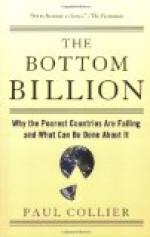That blue blade that the king’s son bears,—but this
Blunt thing—!” he snapt and flung it from his hand,
And lowering crept away and left the field.
Then came the king’s son, wounded, sore bestead,
And weaponless, and saw the broken sword,
Hilt-buried in the dry and trodden sand,
And ran and snatched it, and with battle-shout
Lifted afresh he hewed his enemy down,
And saved a great cause that heroic day.
Edward Rowland Sill.
From “Poems.”
[Illustration: JAMES WHITCOMB RILEY]
MY PHILOSOPHY
Though dogs persist in barking at the moon, the moon’s business is not to answer the dogs or to waste strength placating them, but simply to shine. The man who strives or succeeds is sure to be criticized. Is he therefore to abstain from all effort? We are responsible for our own lives and cannot regulate them according to other people’s ideas. “Whoso would be a man,” says Emerson, “must be a nonconformist.”
I allus argy that a man
Who does about the best he can
Is plenty good enugh to suit
This lower mundane institute—
No matter ef his daily walk
Is subject fer his neghbor’s talk,
And critic-minds of ev’ry whim
Jest all git up and go fer him!
* * * * *
It’s natchurl enugh, I guess,
When some gits more and some gits less,
Fer them-uns on the slimmest side
To claim it ain’t a fare divide;
And I’ve knowed some to lay and
wait,
And git up soon, and set up late,
To ketch some feller they could hate
For goin’ at a faster gait.
* * * * *
My doctern is to lay aside
Contensions, and be satisfied:
Jest do your best, and praise er blame
That follers that, counts jest the same.
I’ve allus noticed grate success
Is mixed with troubles, more er less,
And it’s the man who does the best
That gits more kicks than all the rest.
James Whitcomb Riley.
From the Biographical Edition
Of the Complete Works of James Whitcomb Riley.
ULYSSES
This volume consists chiefly of contemporary or very recent verse. But it could not serve its full purpose without the presence, here and there, of older poems—of “classics.” These express a truth, a mood, or a spirit that is universal, and they express it in words of noble dignity and beauty. They are not always easy to understand; they are crops we must patiently cultivate, not crops that volunteer. But they wear well; they grow upon us; we come back to them again and again, and still they are fresh, living, significant—not empty, meaningless, and weather-worn, like a last year’s crow’s nest.




